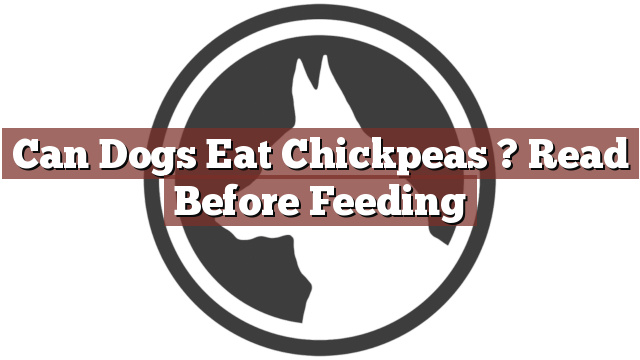Understanding Your Dog’s Dietary Needs
As a responsible pet owner, it is essential to understand your dog’s dietary needs to ensure their overall health and well-being. Dogs have specific nutritional requirements that differ from humans, and it is crucial to provide them with a balanced diet that fulfills these needs. While dogs primarily thrive on a diet consisting of high-quality dog food, many pet owners often wonder if they can incorporate other human foods into their dog’s diet, such as chickpeas.
Can Dogs Eat Chickpeas? Read Before Feeding
Can dogs eat chickpeas? This is a common question that many dog owners have. The answer is yes, dogs can eat chickpeas in moderation. Chickpeas are a type of legume that is packed with nutrients like protein, fiber, vitamins, and minerals, which can be beneficial for dogs. However, it is important to prepare and feed chickpeas to your furry friend in the right way.
Pros and Cons of Feeding Chickpeas to Dogs
Feeding chickpeas to your dog can have several advantages. Firstly, chickpeas are an excellent source of plant-based protein, which can be beneficial, especially for dogs that have certain dietary restrictions or are allergic to animal-based proteins. Secondly, chickpeas are rich in dietary fiber, which can help regulate your dog’s digestion and promote a healthy gastrointestinal system. Additionally, chickpeas are low in fat and contain essential vitamins and minerals, such as folate, iron, and magnesium, which can contribute to your dog’s overall nutritional needs.
However, it is essential to be aware of the potential downsides of feeding chickpeas to your dog. While chickpeas are generally safe for dogs, they can cause digestive issues such as gas, bloating, or diarrhea if not properly cooked or prepared. It is recommended to cook chickpeas thoroughly and avoid adding any seasonings or spices that may be harmful to dogs. Furthermore, it is crucial to introduce chickpeas gradually into your dog’s diet and monitor their reaction to ensure they can tolerate it well.
Conclusion: Weighing the Risks and Benefits of Chickpeas in Your Dog’s Diet
In conclusion, while dogs can eat chickpeas, it is important to do so in moderation and with caution. Chickpeas can offer several nutritional benefits to your dog, including protein, fiber, vitamins, and minerals. However, it is crucial to cook them thoroughly, avoid adding harmful seasonings, and introduce them gradually into your dog’s diet to monitor any adverse reactions. As always, it is recommended to consult with your veterinarian before making any significant changes to your dog’s diet, including the addition of chickpeas or any other human food.
Thank you for taking the time to read through our exploration of [page_title]. As every dog lover knows, our furry friends have unique dietary needs and responses, often varying from one canine to another. This is why it's paramount to approach any changes in their diet with caution and knowledge.
Before introducing any new treats or making alterations to your dog's diet based on our insights, it's crucial to consult with a veterinarian about [page_title]. Their expertise ensures that the choices you make are well-suited to your particular pet's health and well-being.
Even seemingly harmless foods can sometimes lead to allergic reactions or digestive issues, which is why monitoring your dog after introducing any new food item is essential.
The content provided here on [page_title] is crafted with care, thorough research, and a genuine love for dogs. Nevertheless, it serves as a general guideline and should not be considered a substitute for professional veterinary advice.
Always prioritize the expert insights of your veterinarian, and remember that the health and happiness of your furry companion come first.
May your journey with your pet continue to be filled with joy, love, and safe culinary adventures. Happy reading, and even happier snacking for your canine friend!

